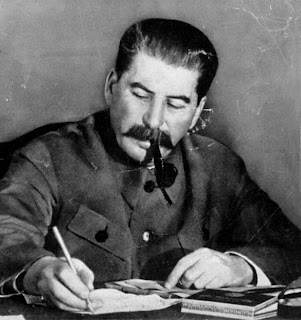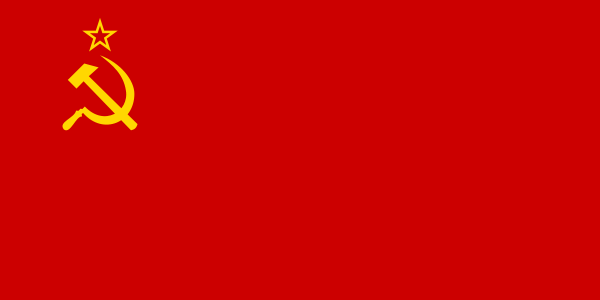Dzhugashvil
Joseph Stalin  born in Tiflis in the (1879) by a drunken cobbler and a washerwoman, from 1894 to 1899 with the help of the parish attended the theological seminary in Tiflis, where he could know which liberal ideas and revolutionary were deeply popular in the Caucasus, a place of exile for political prisoners. In 1898 he enrolled in a secret association of Tiflis, discovered he was expelled from the seminary. Began shortly after a real political activity, of course, in contrast to the tsarist, so that was jailed in Batumi and in Siberia. In '04 he returned to the Caucasus, where he followed the ideas of Lenin which provided the beginning of a revolution coordinated by the Socialist Party, during the '05 revolution, Lenin noticed because of his actions now until '17 spregiudicate.Da his reputation was on the rise (it became part of the central committee of the party and became a director of Pravda, had become again note the publication of the essay "Marxism and the national problem"), despite periods of imprisonment in Siberia, deported him three times, the last of which lasted from '13 to '17, then moved to Petersburg, where adhered to the ideas of revolutionary Lenin. While Lenin and Trotsky stated in the meetings of the Bolshevik party, Stalin, Sverdlov along with taking the task of the central committee of the organization that did not allow them to stay forever "Under the spotlight, but allowed him to have control of the party. Once the Politburo (governing body of the Communist Party) or to come join. After the October revolution of '17 S. worked to win the civil war, he became general secretary of the committee in April 3, 1922, with the progress of the process of bureaucratization of the party increase its power greatly.
born in Tiflis in the (1879) by a drunken cobbler and a washerwoman, from 1894 to 1899 with the help of the parish attended the theological seminary in Tiflis, where he could know which liberal ideas and revolutionary were deeply popular in the Caucasus, a place of exile for political prisoners. In 1898 he enrolled in a secret association of Tiflis, discovered he was expelled from the seminary. Began shortly after a real political activity, of course, in contrast to the tsarist, so that was jailed in Batumi and in Siberia. In '04 he returned to the Caucasus, where he followed the ideas of Lenin which provided the beginning of a revolution coordinated by the Socialist Party, during the '05 revolution, Lenin noticed because of his actions now until '17 spregiudicate.Da his reputation was on the rise (it became part of the central committee of the party and became a director of Pravda, had become again note the publication of the essay "Marxism and the national problem"), despite periods of imprisonment in Siberia, deported him three times, the last of which lasted from '13 to '17, then moved to Petersburg, where adhered to the ideas of revolutionary Lenin. While Lenin and Trotsky stated in the meetings of the Bolshevik party, Stalin, Sverdlov along with taking the task of the central committee of the organization that did not allow them to stay forever "Under the spotlight, but allowed him to have control of the party. Once the Politburo (governing body of the Communist Party) or to come join. After the October revolution of '17 S. worked to win the civil war, he became general secretary of the committee in April 3, 1922, with the progress of the process of bureaucratization of the party increase its power greatly. 
With Lenin's death (January 24, 1924) Stalin began a serious battle with Trockji, the first wanted to impose his idea of \u200b\u200bsocialism in one country, the second would have liked to continue with the ideas Lenin. Prevailed, the party secretary, who initiation of reforms in pursuit of his ideas (which saw a departure from the international tradition of Marxism), created the collectivization campaign and devised the five-year plans to industrialize Russia. In '36 they began to pose the problem of Nazism, Stalin for having more freedom to act, he decided to eliminate all forms of opposition (that was the beginning of Stalin's purges), starting from leaders such as Kamenev, Zinoviev, Trozkji, Radek who could replace him in case of crisis, the facts were either exiled or killed as Trozkji. In '39 the war began, which put a strain on the ability of S. which however was unable to resist even in difficult times, he used the conflict to reintroduce traditional values \u200b\u200bsuch as patriotism, Slavic solidarity, appreciation of Russian history. At the end of the war succeeded in imposing the communist regimes in those countries occupied by the Red Army, thus altering the theory of socialism in one country, however, in a sense, he contented himself with those results and returned to his conservative ideas even though the contrast with countries capitalists were accentuated (began the Cold War). He died in Moscow in 1953.
----------------------------------- -------------------------------------------------- -------------------------------------------------- ---
Michajlovic Vyacheslav Scriabin (Molotov)
Pseudonym of Vyacheslav Molotov Michajlovic Scriabin (Kukarka 1890 - Moscow 1986), Russian revolutionary, a the most important Soviet officials during the era of Joseph Stalin. He approached the Bolshevik movement in 1906, and since then he sent Molotov (which in Russian means "hammer"). In 1912 he founded the newspaper with Stalin in Pravda, but in the same year he was deported to Siberia by the tsarist government, a few years later he escaped and in 1917 participated in the Russian Revolution. After the rise of the Bolsheviks to power, played high positions within the Communist Party: a close associate of Stalin, was first secretary of the Party Central Committee Politburo member and later, from 1930 to 1941 was Chairman of the Board of Commissioners of people and in 1939 as foreign minister negotiated the Treaty on the Non-aggression with Germany, known as the Molotov-Ribbentrop pact. During the Second World War he was Deputy Chairperson of State for Defence. He held the post of foreign minister until 1949, and as such he headed the Soviet delegation to the Conference of San Francisco, during which it was founded the United Nations (1945), represented the USSR in the conference in Tehran, Yalta and Potsdam, where he outlined the global division of influence in both Soviet and Western blocs. After Stalin's death (1953), was foreign minister until 1956. Member of the Presidium of the Central Committee, was against Nikita Khrushchev in 1957 but had to resign from government posts. He was appointed Ambassador to Mongolia (1957-1960) and representative of the International Atomic Energy Agency in Vienna (1960-1962). Expelled from the party in 1964, there was only readmitted in 1984.
-------------------------------------------- -------------------------------------------------- --------------------------------------------
Ivan Stephanovic Koniev
Born in 1897, comes in arming Red Army in 1918. And lieutenant general in June 1940, driving for a few months the defense of Moscow, then the second Ukrainian front. General since 1943, scored his most important victory in early 1944, defeating the Germans at Korsun Dnieper River, in the "second Stalingrad" of the Nazi-Soviet war. During the offensive final against the Third Reich leads the first Ukrainian Front, which together with the first front Zhukov of Belarus to complete the encirclement of Berlin. Divided by a fierce rivalry with Zhukov, who is often preferred by Stalin, able to take its place in 1946 and will be appointed commander of ground troops. In 1955 he became commanding general of the Warsaw Pact troops. He died in 1973.
-------------------------------------------- -------------------------------------------------- --------------------------------------------
Konstantin Rokossovskij
Born in 1896, is a very young Red Army officer. Victim of Stalin's purges carried out by the end of the thirties, in July 1941 and resumed service in September 1942 commands the front of the Don. He received the German surrender at Stalingrad. Later he was appointed Marshal of the Soviet Union by Stalin. After his successes on the front of Belarus and the campaign leading to the liberation of Poland, is assigned by Stalin to the operations in Pomerania and Prussia and joins the Zhukov conquest of Berlin. He died in 1968.
-------------------------------------------- -------------------------------------------------- --------------------------------------------
Semjon Konstantinovic Timoshenko
Born in 1895, and of peasant origin, he enlisted in the cavalry and then Tsarist become a Red Army officer during the Civil War. After the Russo-Finnish companies, Marshal and was appointed commissioner of Defense and implement a major reorganization of the army. In 1941, commanding the western front by delaying the German advance, but in May of 1942, when the Germans conquered the Crimea and advancing on Stalingrad, is removed by Stalin. He died in 1970.
-------------------------------------------- -------------------------------------------------- --------------------------------------------
Georgi Zhukov Konstantinovic
Born in 1896 and son of a shoemaker, he enlisted in the cavalry in 1914 and quickly became sergeant. Schieratosi with the revolutionaries in October 1917, makes a phenomenally successful career in the Red Army. It's the legendary general who has never lost a battle. " In 1939 commanded the Russian counter-offensive against Japan, in 1940 the attack on Finland. Coordinating the defense of besieged Leningrad and block the German advance on Moscow, and then get the historic victory at the Battle of Stalingrad. As commander in chief of the Soviet armed forces leads all major military operations in 1945 and through Poland to launch the final assault on Berlin. After the war, fearing the popularity of Stalin banishes the darkness. Minister of Defence in 1955 and a member of the Presidium of the CPSU Central Committee, will be retired by Khrushchev. He died in 1974.
----------------------------------------------- -------------------------------------------------- -----------------------------------------






,_Soviet_military_commander.jpg)

0 comments:
Post a Comment